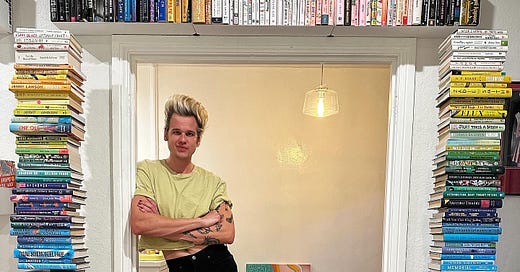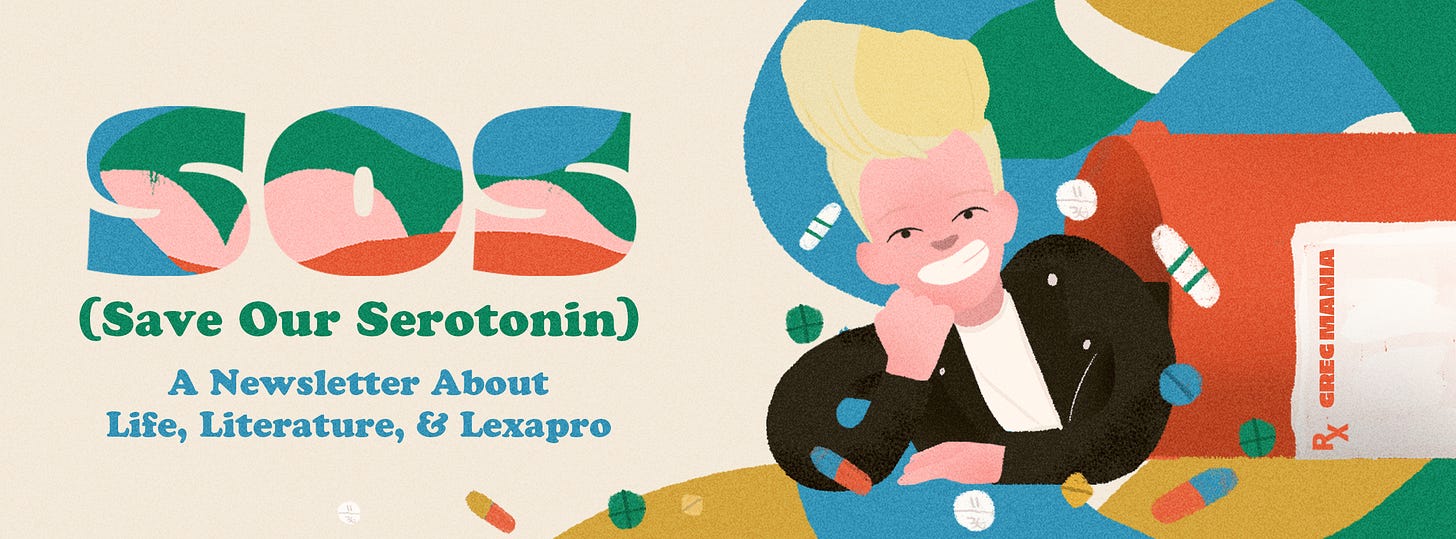Sending Out an SOS on Substack
Greg Mania's distress signal will make you laugh, cry, and wanna subscribe
Hello Bleeders!
Today I have another fantastic edition of our newsletter series—this time with
, author of Born to Be Public and creator of the Substack.Before we dive in, please behold Greg’s gorgeous book collection. The aesthetic is on point. #bookgoals
What’s the basic premise and tagline of your newsletter?
GM: SOS (Save Our Serotonin) is a bimonthly newsletter about life, literature, and Lexapro. It’s mostly personal essays, book content, peppered with the occasional humor piece here and there. So, my three favorite things to write about. There are essays about living with chronic illness and pain, moving to Los Angeles, and stories like the time I had to get a blood clot removed from my literal butt; there are book roundups; and humor pieces like, “So You Wanna Be a Sickly Victorian Woman.” Writing this Substack scratches every writerly itch I have.
When and why did you start your newsletter?
GM: I started SOS in the summer of 2021, after Meta recruited me—and about 100 other writers—to write for Bulletin, the now-defunct newsletter platform they launched that same year. After it sunset in 2022, I moved over to Substack, where I happily continue to embarrass my family with my unhinged missives.
Who’s your main audience?
GM: ANYONE WHO IS ON ANTIDEPRESSANTS.
How is your newsletter differentiated from the other newsletters in your niche?
GM: I think it does a pretty good job at offering a diverse array of content, but also is able to fit under the umbrella of “I want attention.”
What’s your editorial strategy?
GM: Like I mentioned, I try to keep things fresh and mix it up. I have a folder on my computer that contains topics I’ve been mulling over, all of which call out to me in their own time. These range from things happening in my own life, to things I want to respond to, and everything in between. It might result in an essay, a list, maybe a collaboration with another writer. As for my content calendar, I usually plan it out one, maybe two, months in advance, but sometimes I’ll schedule things I already know I’ll publish, like a queer book roundup in June, for example.
How many subscribers do you have?
GM: I have 2,226, if you don’t count the three old/back-up emails I used to subscribe to my own newsletter.
Do you offer paid memberships? If so, explain when and why you turned that on, what your subscription offering includes, the cost, how many subscribers are part of your paid community, and any takeaways from going paid.
GM: I do. I’m employing what I call the PBS model; I pledge that SOS is—and will remain—a 100 percent free, reader-supported publication. I believe every writer should be compensated for their work, and I support anyone who puts their content—or a portion of it—behind a paywall. As for me, I just love to make people think and laugh, and want folks to be able to access every syllable in my newsletter. But it’s not just about me. SOS would not be possible without my editorial assistant, Jesse Adele, and James Jeffers, the artist with whom I collaborate on almost every piece. And I need to make sure they get paid, and promptly. This is why I encourage folks to become paid subscribers: you’re not just supporting me, you’re supporting the team behind SOS by compensating us for the time we devote to generating the content we love making for you.
Have you tried any other methods of monetization?
GM: Related to my newsletter? No. But if we’re talking broad strokes, yes. Alas, I just don’t have the time and patience it requires to maintain—let’s go with—editorially desirable feet.
Tell us about your newsletter’s growth trajectory. What have been the most effective ways for you to promote your newsletter?
GM: In the beginning, when I was publishing my newsletter on Bulletin, I got a lot of support from the Meta team: They ran a lot of ads and promo on Instagram and Facebook, which resulted in a good deal of subscribers. Now that I’m on Substack, I attribute most of my growth to the writing community, many of whom have their own publications. I love the Recommendations feature because it’s a way for us to introduce and send new readers to each other—and those readers can share our content with their friends and so on and so forth—so I’m always keeping an eye out for what newsletters my favorite writers are recommending, because I find all the bangers through them.
What’s been your most popular content, and your guess as to why?
GM: According to the “Most Popular” section on my Substack, it’s an essay about my obsessive-compulsive disorder, another essay about being friends with my ex, and one called, “I Would Come Out to M3GAN.” So, no.
How has your newsletter served your career as an author? (Aka: Is it a good chunk of your income? Does it help you sell books or workshops? Has it helped you develop material? Has it helped you secure bylines? Etc.)
GM: All of the above! It’s truly my favorite project to work on, because I’m my own boss. I run my own editorial calendar. The only pressure I contend with is self-imposed. So, because I can just focus on being myself, both as a writer and person on the whole, I write about things that I care about, that make me laugh—and I know it’ll reach readers who will care and laugh along the way with me. It’s all connected—it’s an extension of my memoir, especially the voice, the work I do for other publications as a freelancer, and everything I do to help contribute to the literary community—and in return, my book finds new readers, my workshops introduce me to new students, and so on and vice versa.
What’s your #1 tip for writers who want to start a newsletter?
GM: Oh, god, this is so cheesy, but, to my chagrin, it is true: be yourself. Don’t write things purely for the sake of getting clicks. Don’t write something just because you think it’ll generate a buzz. Write what you love, and someone else out there will love it, too, and they will share it with someone, and that person will share it with another person, and before you know it the ripples you start with will return as an outpouring of love and support. It takes a lot of time and patience, but if you commit to it, and you take care of your words, eventually, your words will take care of you.
What’s your #1 tip for writers trying to grow their existing newsletter?
GM: Lean on your fellow writers who also write newsletters. We’re all just trying to carve our respective spaces here, so it’s important to have friends who share both your excitement, frustration, and everything in between. By doing so, you’ll receive invaluable advice. Someone might be like, “Hey, have you thought about putting an audio feature behind a paywall?” And you might be like, “No, but I’ll try that!” Before long, you’ll be able to pay it forward. My best friend, Tara, and I voice-note each other all day long, and a lot of our conversations are about creativity and how we can continue to push the boundaries of ours, and that has inspired a lot of the content I have published. Have an open mind and an open heart, and the rest will follow.
Shout out another writer-newsletter that you admire and enjoy consuming.
GM: HELL YES, BABE:
by by byAnything else you’d like to add?
GM: Thank you to everyone who subscribes to
, to anyone who’s said a nice thing about it or me, and/or has shared it with a friend, family member, and/or colleague. Your support means the world to me. And if what you read tickles your pickle, please consider becoming a paid subscriber. I live in California — I have to list collateral to buy gas!Lol, I feel that. Thank you so much, Greg!
➡️ Make sure you subscribe to SOS (Save Our Serotonin) and follow Greg on Twitter/X and Instagram at @gregmani.
P.S. If you want to start a newsletter or take it to the next level, check out my newsletter course for
. Half the posts are free, and the other half are just $10!So… ROLL CALL! 🗣️
Smash that like button and give Greg some love in the comments below.
Let’s connect on social media! I’m @courtneykocak on Twitter/X and Instagram. For more, check out my website courtneykocak.com.







